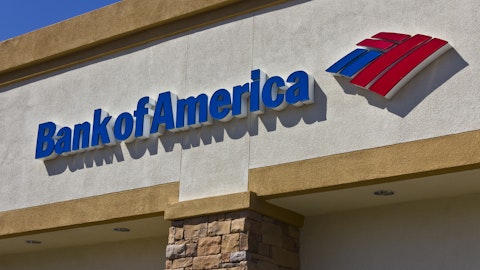There is no central location that keeps track of hedge fund openings, closings, or assets under management. However, we can estimate these numbers (more or less) using incomplete hedge fund databases maintained by commercial companies. It is safe to assume that about 10% of all hedge funds closed in 2016 and their assets under management is currently in the neighborhood of $3 trillion. The three most popular stocks among these hedge funds are Alphabet Inc (NASDAQ:GOOGL), Facebook Inc (NASDAQ:FB), and Bank of America Corp (NYSE:BAC) (see the 10 most popular stocks here).
Humans are interesting animals. An average American thinks that he/she is smarter than average, a better driver than the average driver, fitter and better looking than an average person. This is true for hedge fund managers and stock market investors too. They are delusional people who think they are better investors than most people are. Don’t get me wrong, some of the hedge fund managers are truly talented, but not ten thousand of them.
The NFL is very popular. There are 32 teams in the NFL right now. For a second let’s assume that anyone with some money can start a team and join the league; this is the case with the hedge fund world, you don’t really need the permission of anyone to start a “hedge fund” and report your returns to commercial hedge fund databases. If the number of teams in the NFL goes to 3200 from 32, do you think there will be 99 more quarterbacks as talented as Tom Brady? Think hard before answering this question.
Hedge funds started the same way. The first hedge fund managers -like Alfred Winslow Jones, Warren Buffett, George Soros, Julian Robertson, and Michael Steinhardt- were extremely talented and generated mind boggling returns with less market exposure. Most people don’t know that Warren Buffett was a hedge fund manager before turning Berkshire Hathaway into a vessel for permanent capital. We will talk about this shortly.
The first hedge fund managers were able to achieve these amazing returns because they were managing very small portfolios compared to the ones that are managed today by average hedge funds. Julian Robertson started Tiger Management with $8 million and it took him more than 11 years of amazing returns to reach $1 billion in assets. Nowadays, some brand new fund managers launch funds with $2-$3 billion with track records nowhere near as impressive as Robertson’s. Check out Tiger Management’s returns below to see what we mean by impressive returns:
| Year | Tiger Management | S&P 500 Index |
|---|---|---|
| 1980 | 54.9% | 28.9% |
| 1981 | 19.4% | -4.9% |
| 1982 | 42.4% | 21.5% |
| 1983 | 46.7% | 22.6% |
| 1984 | 20.2% | 6.3% |
| 1985 | 51.4% | 31.7% |
| 1986 | 16.2% | 18.7% |
| 1987 | -1.4% | 5.3% |
| 1988 | 21.6% | 16.6% |
| 1989 | 49.9% | 31.7% |
| 1990 | 20.5% | -3.1% |
| 1991 | 45.6% | 30.5% |
| 1992 | 26.9% | 7.6% |
| 1993 | 64.4% | 10.1% |
| 1994 | -9.3% | 1.3% |
| 1995 | 16.0% | 37.6% |
| 1996 | 37.7% | 23.0% |
| 1997 | 56.1% | 33.4% |
| 1998 | -3.9% | 28.6% |
| 1999 | 19.0% | 21.0% |
Please note that these returns are after huge management and performance fees. Robertson had $10.5 billion in assets at the beginning of 1997 and delivered a net return of 56% (his investors made $6 billion that year). His gross return was about 73%, so his cut was almost $2 billion.
Since nobody is holding the gates of the hedge fund industry, these types of compensation numbers attracted literally tens of thousands of people into the industry. Do you think this 100-fold increase in participation in the hedge fund industry created a 100-fold increase in truly talented investors like Warren Buffett, Julian Robertson, or George Soros? Sure, the new generation of hedge fund managers had talented names like David Tepper, Steve Cohen, and some Tiger cubs like Andreas Halvorsen and Chase Coleman, but the increase in participation largely reduced the average quality of hedge fund managers.
There are thousands of untalented imitators who had achieved a few years of initial good performance because of pure luck. Most investors have no way of separating the good ones from the bad ones and as a result the assets held by the hedge fund industry have been increasing and the average alpha delivered by these hedge funds has been declining to the point that it may even be negative at this point in time.
Since hedge fund assets have been increasing at a breakneck pace, most hedge fund managers have been “forced” to invest in large-cap stocks instead of closing their funds to new investors. That’s why Alphabet Inc (NASDAQ:GOOGL), Facebook Inc (NASDAQ:FB) and Bank of America Corp (NYSE:BAC) are the most popular stocks among hedge funds. One in every 5 equity hedge funds has a position in each of these stocks.
Let me explain the math why this logically makes sense for hedge fund managers.
Let’s say a hedge fund manager can generate 10% alpha with $1 billion in assets. This fund will generate $20 million in management fees, and another $20 million in performance fees. Now, other investors notice that this hedge fund generates 6% net alpha (remember 4 percentage points is kept by the hedge fund as fees) and want to give it money thinking that it can keep generating better than average risk-adjusted returns. So, let’s say this hedge fund receives an additional $9 billion that it invests in large-cap stocks where it doesn’t generate any excess returns. Now, with $10 billion in AUM the fund still generates $100 million in alpha. Unfortunately for its investors, it will collect $200 million in management fees and another $20 million in performance fees. So, its net alpha (after fees) will go down to -1.2%.
The fund manager collects $40 million in fees in the first situation, vs. $220 million in the second situation. It usually takes fund investors at least a few years to notice that they are being fleeced (remember it took Julian Robertson more than 10 years to prove himself, these things take time). Especially in bull markets where hedge funds continue to deliver positive returns, it takes investors longer to notice that hedge funds on average stop delivering positive alpha. If we assume that it will take investors 5 years to notice the decline in alpha, the fund manager would have collected more than a billion dollars in fees. This would have taken him 25 years if he continued to operate honestly and charged only $40 million/year.
So, the biggest problem in the hedge fund industry is pretty simple. There is way too much demand for hedge fund managers. They shouldn’t be managing $3 trillion. They should be managing less than $1 trillion (maybe $500 billion) so that they keep generating positive alpha.
The second biggest problem in the hedge fund industry is that the biggest hedge fund investors are unsophisticated retirement and pension funds that are managed by unqualified people. These pension fund managers tend to invest in larger hedge funds whose real purpose has shifted into harvesting management fees. These people know that they won’t lose their jobs because they decided to invest in Pershing Square or Paulson & Co. These people behave like herds of sheep.
These days we are finally going through a slow moving phase where public opinion is turning against hedge funds and active investing in general. More and more people are starting to believe that they will be better off if they invest in index funds.
Our research has been showing that this is for the most part true when it comes to investing in large-cap stocks. Hedge fund managers, on average, can’t generate enough outperformance to justify their 2-and-20 fee structure. However, their smaller-cap stock picks are still doing extremely well. For example, we publish a quarterly newsletter and share the list of the consensus small- and mid-cap stock picks of the 100 best performing hedge funds. We launched this strategy almost 3 years ago and its stock picks have outperformed the S&P 500 Index ETF (SPY) by nearly 20 percentage points during this period. Passive investors returned 30% vs. the consensus small- and mid-cap stock picks of hedge funds returning 50%. Most people aren’t aware of this fact because most hedge funds allocate only a small percentage of their portfolios to small- and mid-cap stocks. Currently we are offering a 14-day risk-free trial and you can download a copy of the latest issue of our quarterly newsletter by signing up here.
Directly investing in equity hedge funds isn’t an optimal strategy for investors. You don’t need to pay 2-and-20 to hedge funds so that they go ahead and buy Alphabet Inc (NASDAQ:GOOGL), Facebook Inc (NASDAQ:FB), and Bank of America Corp (NYSE:BAC). There are exceptions, but a more optimal investing approach is to use index funds for the large-cap portion of your portfolio and imitate hedge funds’ consensus small- and mid-cap stock picks in the small-cap portion of your portfolio. Hedge funds reveal their portfolios once a quarter, so it really doesn’t make sense to pay them an arm and a leg so that they invest most of your money in large-cap stocks and enrich themselves by charging mind numbing fees.
Disclosure: None





